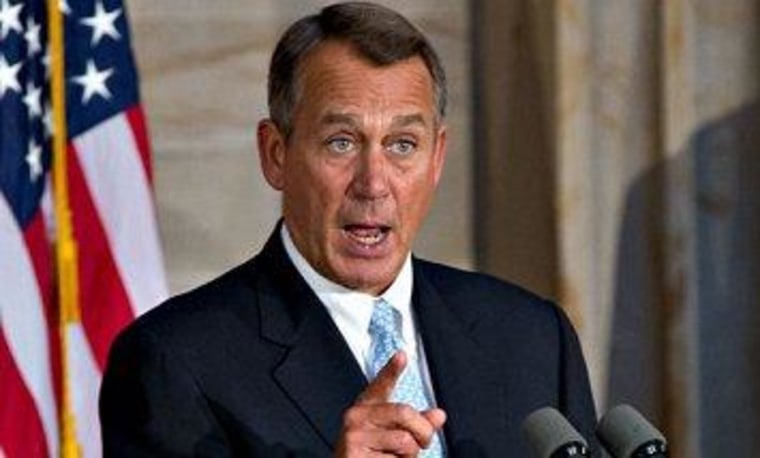As promised, the U.S. House of Representatives voted, once again, to repeal the Affordable Care Act, with a bill passing late yesterday, 229 to 195. Now that House Republicans have held this vote 37 times, is it safe to assume they've sufficiently scratched this itch? Perhaps not.
House Speaker John Boehner (R-OH) left the door open Thursday to holding additional votes to repeal Obamacare, hours before a scheduled floor vote to wipe out the law."When we have further votes that we take, we'll let you know," Boehner told reporters."We're going to keep the focus on Obamacare," he said.
In other words, don't be too surprised if repeal vote #38 is right around the corner. It's not like these folks have anything better to do with their time (or our government).
Before we move on, however, it's worth pausing to appreciate why these votes matter. At a certain level, it's easy to assume they don't -- even GOP members themselves acknowledge they're trying to make pointless political statements with these 37 votes, and they don't seriously expect to affect public policy. This is just about Republicans trying make themselves feel better about themselves.
Or so the assumptions go. There are, however, some other angles to keep in mind. First, note that after nearly four years of debate and discussion, Republicans are desperate to destroy the progress -- and in the process, strip families of their health care benefits, scrap tax breaks for small businesses, increase the deficit, etc. -- but still haven't come up with a health care policy of their own.
Second, each one of these 37 votes is a reminder that House Republicans not only aren't governing, they don't seem to care about giving the appearance of governing. The legislative process has become something of a laughingstock since Boehner became Speaker, and yesterday was a reminder of a deliberate and unnecessary gridlock.
Third, note that many of the cost-saving provisions in "Obamacare" have been adopted as part of the House Republicans' own budget plan. By voting to eliminate the ACA, Republican lawmakers are also inadvertently trying to gut their own budget blueprint.
And finally, there may also be a real-world policy implication to these ridiculous stunt votes.
Sarah Kliff raised a good point yesterday that I'd overlooked: "This slew of three dozen repeal votes have changed both how the Affordable Care Act works and how the public perceives it."
Last month, the Kaiser Family Foundation polled Americans on whether the Affordable Care Act is still law. Twelve percent of Americans -- that's about one in eight people -- think that Congress repealed the Affordable Care Act. Another 23 percent aren't sure or refused to answer the question.Congress' repeal votes get media attention and coverage, which probably explains where these numbers come from. After hearing so much about congressional repeal, it's hard to blame Americans who think that the efforts have succeeded.The uncertainty that these repeal votes have created can have real consequences for the Affordable Care Act. There's fairly comprehensive literature that suggests that when regulations seem like they might get repealed, people resist them aggressively.
This doesn't get much attention, but in order for the Affordable Care Act to work, people actually have to participate -- which is to say, they have to sign up for the benefits to which they are entitled. Ignorance breeds failure -- if ignorance leads to less participation, costs will go up and the strain on the system will take a serious toll.
So, in real-world terms, every person who asks, "Health care reform? Wasn't that repealed by Congress?" is slowly undermining the efficacy of the law itself. House Republicans aren't just spinning their wheels with these dumb votes; they're also slowly making the public more confused, and that confusion carries consequences.
